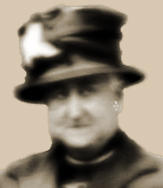Laughter and pain
Lady Bracknell attaches no blame to this phenomenon. Over the years, she has come to suspect that not being able either to remember or imagine pain is part of the human race's innate system of self-preservation. None of our forebears would have set out from their cave dwellings, armed only with puny spears, to try to bring down a mammoth or two for supper if their brains had permitted them, even for a brief moment, to summon up a really detailed mental picture of just how much it was going to hurt should said mammoths violently object to their plans.
Of course, it is possible to remember and imagine pain to a certain degree. But, although one can remember that something was painful, or imagine that something would very likely be painful, the nature of the pain, and the experience of being in pain, are strangely elusive. One can not re-live physical pain as one can - all too easily, unfortunately - its emotional counterpart.
For example, Lady Bracknell once had an infected wisdom tooth. She knows that it throbbed unbearably; that the side of her face swelled up in a most unbecoming manner; and that she could barely speak or concentrate for the pain. But the pain itself is gone, and she cannot recreate it in her memory.
As was drummed into many of us at primary school, pain is the body's way of telling you that part of it is damaged. If we did not have pain receptors, we would not draw our hands back from the flame. We fear pain in the most primitive parts of our brains, presumably precisely because a damaged body was one which had a much lower chance of surviving long enough to reproduce in those far off times when the supper menu consisted of charred mammoth on a stick.
It is for this reason - or so Lady Bracknell's interpretation of her own experiences has led her to believe - that we view pain in other people, particularly those with whom we have a close bond, with horror. We are well aware that pain hurts. When we have experienced pain ourselves in the past, it has made us miserable. We therefore equate the prospect of living with constant, unremitting, relentless pain with untold misery.
However, as a number of Lady Bracknell's regular readers will know from personal experience, chronic pain does not necessarily go hand in hand with chronic misery. (Chronic exhaustion, yes: but that is a separate issue.)
Were Lady Bracknell to have the facility to "lend" her pain for a period of twenty four hours to someone who is not accustomed to it (a facility she has wished for on many occasions), that individual would be brought to his or her knees by its intensity within only a very few of those hours. (He or she might also learn just how insulting it is to make casual comments such as, "Oh, but it's not really a problem for you, is it? You're used to it".)
However, there are two very good reasons why so many people who live with chronic pain adopt a generally cheerful demeanour:
- One has quite enough to deal with already in simply managing the pain. Driving away one's friends, family and colleagues by means of being constantly ill-tempered is no way to improve what remains of one's quality of life.
- The pain will be much worse if one insists on being permanently miserable.
Many of Lady Bracknell's closest friends live with chronic pain themselves. All go through difficult times when the pain is temporarily all-encompassing but, in the main, they spend a great deal of time laughing. All have learned over the years (although probably not consciously), that laughter produces endorphins and that those endorphins reduce pain levels.
(Lady Bracknell's own laugh has attained a certain local notoriety of its own. It is said to be infectious. Plans have been made to capture it in some manner of recording device, and sell it as a Christmas stocking filler. On more than one occasion, stand up comedy performers have offered Lady Bracknell free tickets for all the remaining shows on their tour. Close friends know that, if Lady Bracknell can not be brought easily to laughter, then it is high time they were worrying about her health.)
Why has Lady Bracknell written on this subject at such tedious length? Because she wishes to dispel once and for all the not-unnatural assumption, prevalent amongst persons who have never themselves been in pain for lengthy periods of time, that "someone who's clearly enjoying themselves that much can't really be in very much pain at all".
If she can manage to change the perceptions of even one person by means of what she has written today, then the time spent composing this blog entry will not have been wasted.
Addendum
Lady Bracknell forgot to mention that she can be seen (and heard) talking about her approach to living with chronic pain on the DIPEx website. There will be a small prize (the precise nature of which is yet to be decided) for the first reader not personally acquainted with her ladyship who can identify her from amongst the many individuals featured.











4 Comments:
It made sense to me. I'd just written a whole big long thing about why it made sense but it was corny. So i've deleted it. Basically i can see why equating pain with misery is damaging. The impact is distorted when other people see you 'happy'.
That's what i got from it anyway.
The Gorse Fox is humbled by such strength of character.
The Silver Vixen is another example of Lady Bracknell's fortitude. Despite nine surgical procedures on her spine, and considerable nerve damage, she remains in pain; yet somehow reatins her sense of humour and the infectious sparkle that makes her the focus and heartbeat of our family.
God Bless all people who live in pain.
The Gorse Fox would like to apologise for the typographical error in the previous comment. The word "reatins" should obviously be "retains".
In his denfense, he washed his hands this morning and now can't do a thing with them !
Thankyou ma'am for your concise and entertaining thoughts on this subject.
My dearest wish is to get people (present company excepted) to understand that laughter is often its own end. I am not laughing "through" or "despite" the pain; and there is no immutable correlation between "laughter" and "cheerfulness".
Post a Comment
<< Home